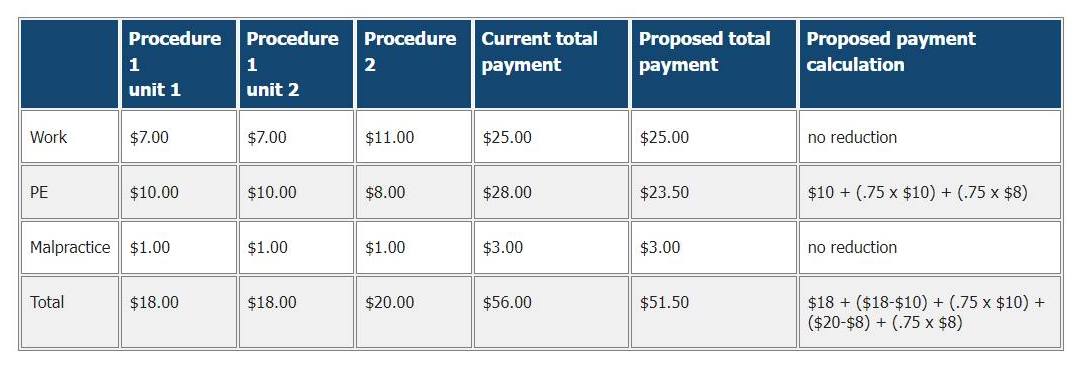The Medicare Multiple Procedure Payment Reduction (MPPR) is a reimbursement reduction that applies when to billable services when multiple services are furnished by the same provider to the same patient in the same session on the same day.
How does Medicare MPPR affect a physical therapy claim?
For example, if a physical therapist in private practice delivers 4 billable CPT codes to a patient in a single treatment session the first highest relative value unit will be paid at the full allowed amount and all subsequent CPT codes will be reduced by MPPR.
How Does Medicare MPPR Work?
According to Novitas-Solutions “full payment is made for the unit or procedure with the highest PE payment.
For subsequent units and procedures furnished to the same patient on the same day, full payment is made for work and malpractice and 50% payment is made for the PE for services submitted on either professional or institutional claims.
To determine which services receive the MPPR, we rank the services according to the applicable PE relative value units (RVU) and price the service with the highest PE RVU at 100% and apply the appropriate MPPR to the remaining services.
When the highest PE RVU applies to more than one of the identified services, we sort and rank these services according to highest total fee schedule amount and price the service with the highest total fee schedule amount at 100% and apply the appropriate MPPR to the remaining services.
Example below is based on the 75% reduction for institutional settings as referenced in CR7050-Multiple procedure payment reduction (MPPR) for selected therapy services.” Link
In the screenshot below you can see the breakdown of reimbursement for institutional proviers.
Physical and Occupational therapists are professional service providers and will experience a 50% reduction in place of the 75% reduction.

Does MPPR affect the Medicare therapy financial threshold? (Formerly called the therapy cap.)
Novitas-Solutions says “The therapy payment amount that has been reduced by the MPPR is applied toward the therapy caps. As a result, the MPPR may increase the amount of medically necessary therapy services a beneficiary may receive before exceeding the caps.”
In other words, if a physical therapist bills Medicare $300 for a therapy session and the allowed amount for that therapy session works out to be $137. After MPPR is applied the new allowed amount may be $98.
$98 will be applied to the patient’s financial threshold for the calendar year.
$98 will also be the allowed amount used to calculate the 20% Medicare Part B coinsurance or deductible.
Eliminate the Impact of Mediare MPPR
The only way I have found to mitigate or eliminate the negative impact of Medicare’s MPPR is to reduce the number of units billed per session.
The optimal choice is to provide single unit sessions to Medicare beneficiaries.
I personally believe that single unit sessions are more beneficial for many Medicare beneficiaries.
Why are single unit sessions more beneficial?
I own and operate a brick and mortar outpatient physical therapy private practice. My most common referral is a person with an orthopedic condition who is already living independently in the community.
I find that after a 60-minute physical therapy session the patient is often overwhelmed with the volume of information and education exchanged.
Breaking the visits into shorter 15 or 20 minute single unit treatments allows the patient and therapist to focus on bite size chunks of information which is easier to retain.
Lower Cost to Medicare and Higher Profitability for the Practice
In a typical 4 unit visit, Medicare MPPR will reduce reimbursement by approximately 24%. So imagine for every $100 allowed the practice collects $75.
If the practice delivers 2 treatments (8 units) a week to a single patient that would equate $75 x 2 = $150.
If a different practice delivers 8 units in the form of single unit treatments across more than 1 patient this practice would collect 8 x $25 = $200.
That represents a 33% increase in revenue and likely a 300% increase in profitability.
* For more comparisons read Physical Therapy Claim Denials & Reason Codes
For more information on Medicare MPPR check out this Guide from Clinicient.

